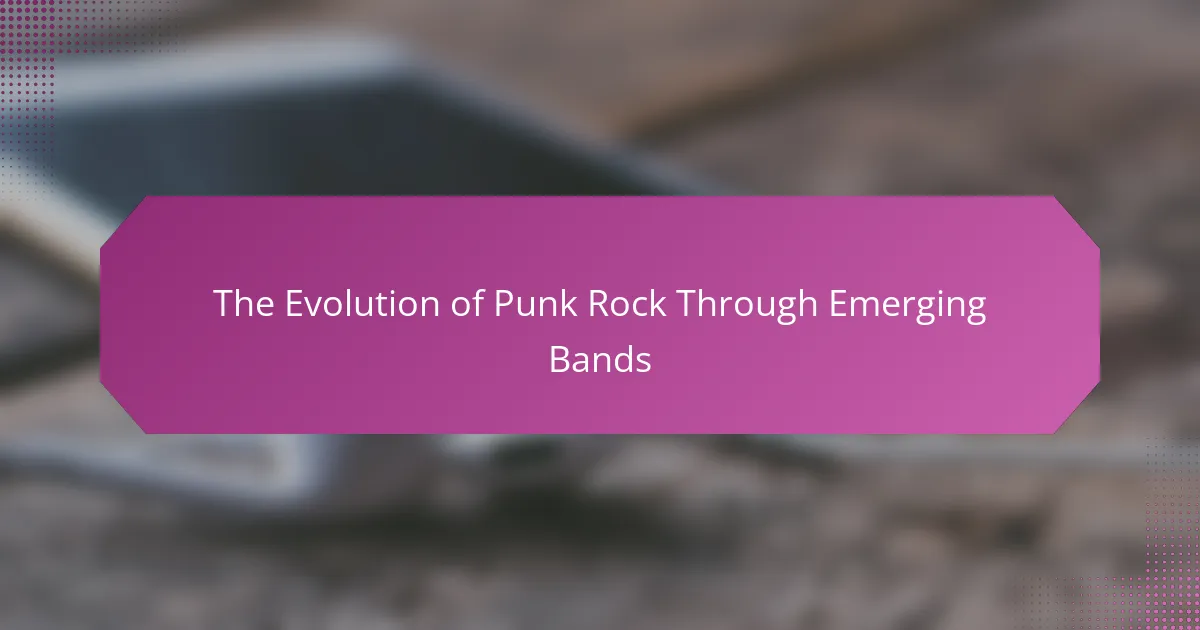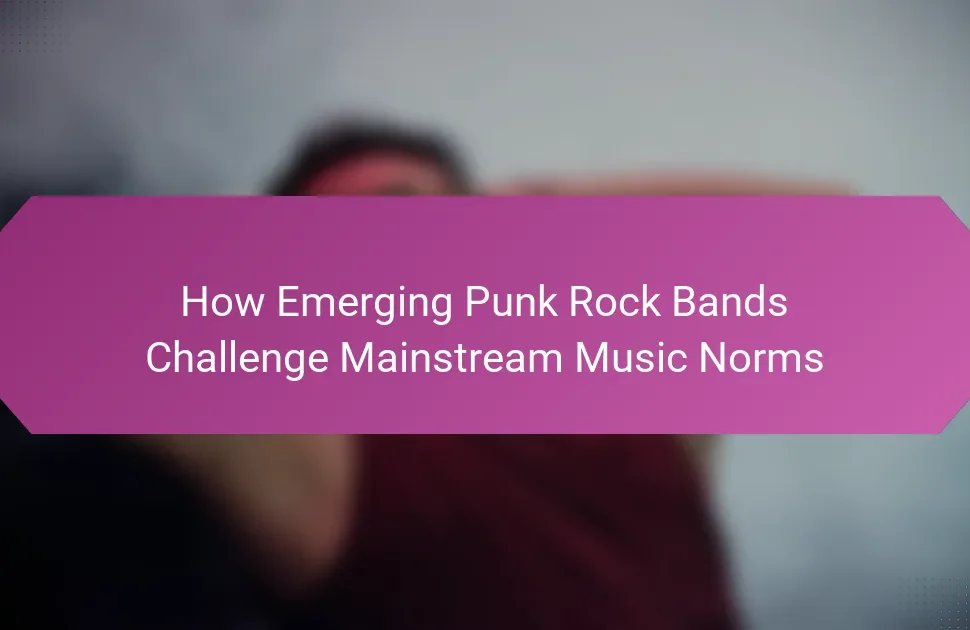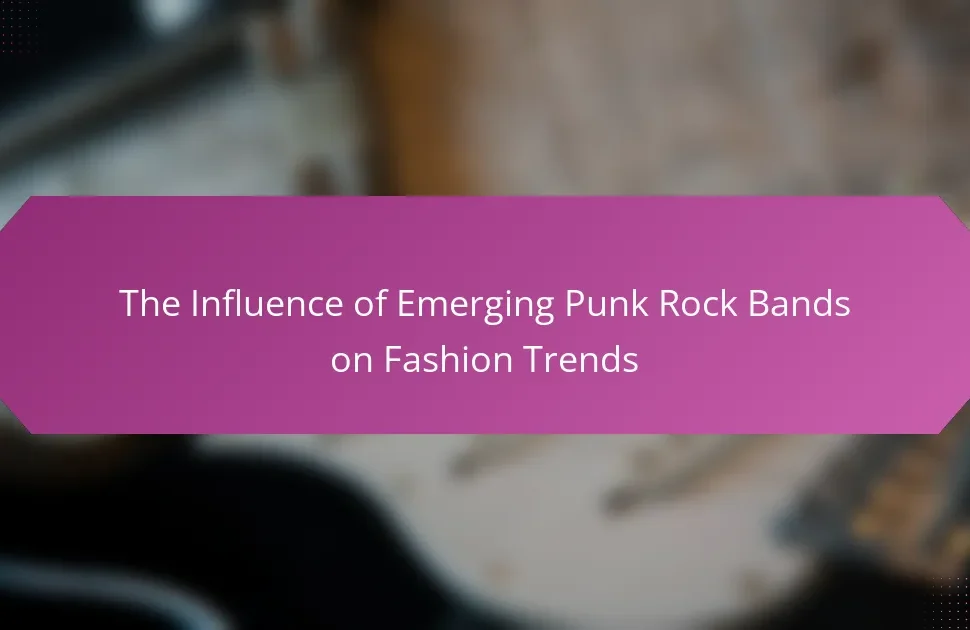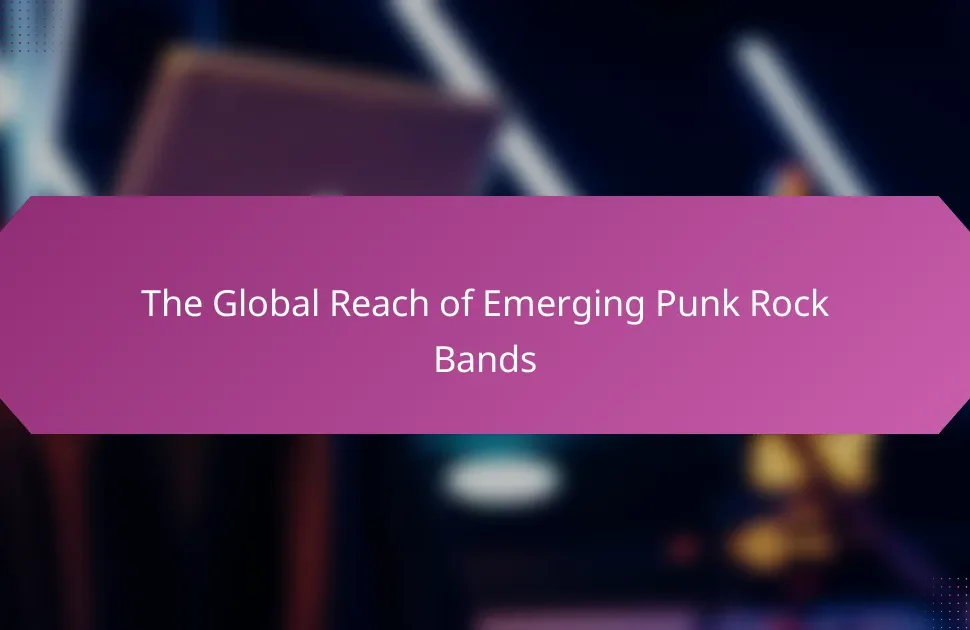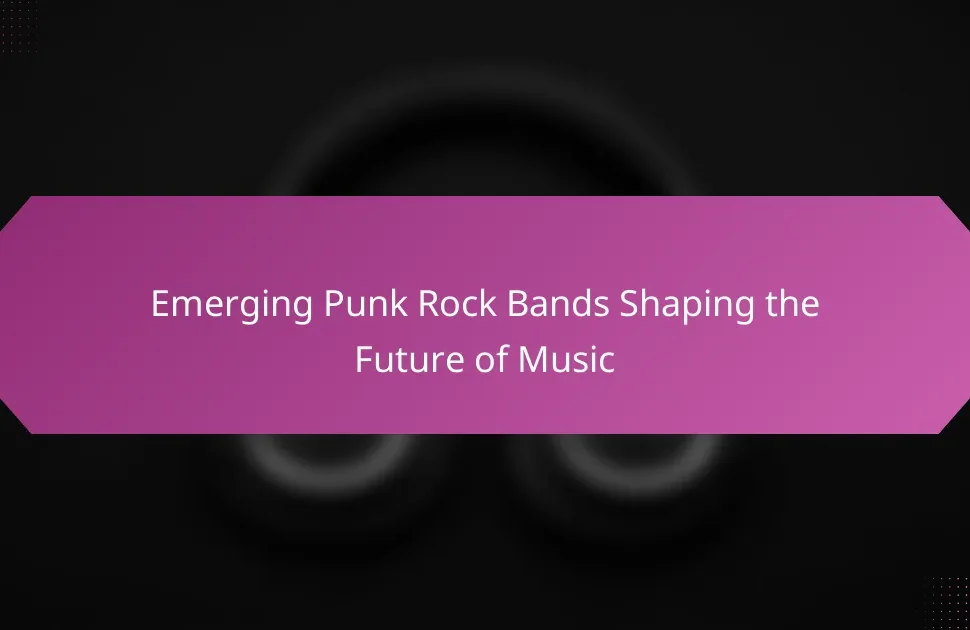Punk rock continues to evolve, driven by emerging bands that redefine its sound and themes. This article explores the genre’s transformation from its 1970s roots to contemporary innovations. It highlights the impact of digital platforms on visibility, the challenges faced by new artists, and the significance of pivotal festivals. Additionally, it examines future trends and the ongoing adaptability of punk rock in response to cultural shifts.
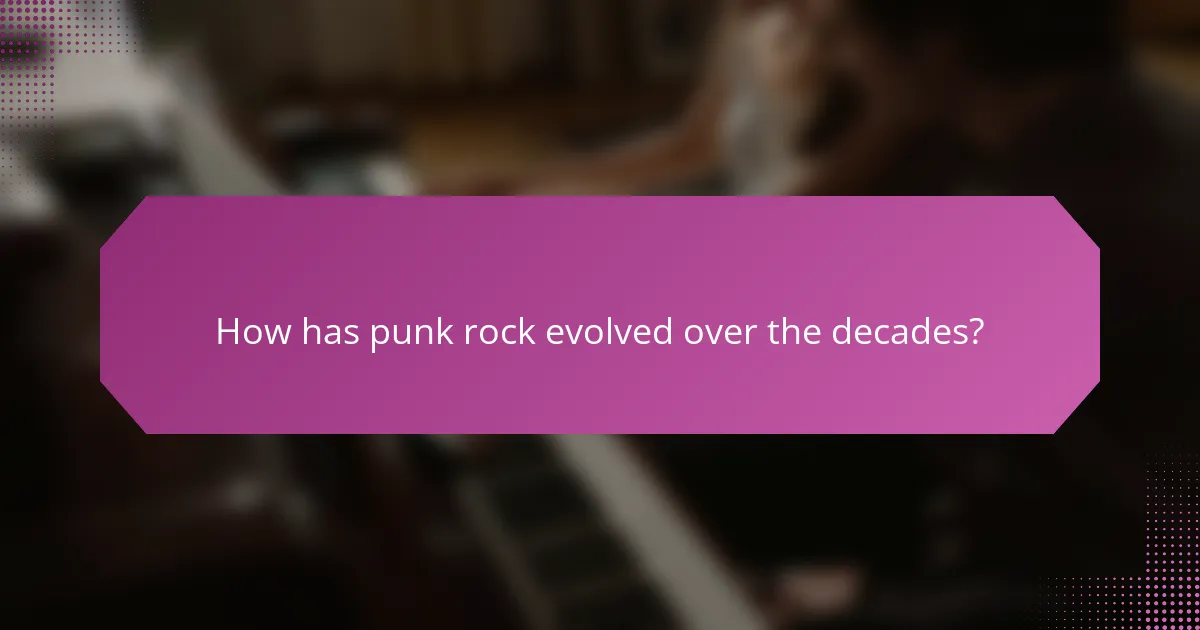
How has punk rock evolved over the decades?
Punk rock has evolved significantly since its inception, shaped by emerging bands that introduced new styles. In the 1970s, bands like the Ramones and Sex Pistols defined the genre with raw energy and anti-establishment themes. The 1980s saw the rise of hardcore punk, with bands such as Black Flag and Minor Threat pushing the boundaries of speed and aggression.
In the 1990s, pop-punk emerged, led by bands like Green Day and Blink-182, blending catchy melodies with punk’s rebellious spirit. The 2000s introduced emo and post-punk revival, with bands like My Chemical Romance and The Strokes bringing emotional depth and a fresh aesthetic.
Today, punk rock continues to diversify, with bands like Idles and Amyl and the Sniffers incorporating influences from various genres, reflecting contemporary social issues. This ongoing evolution showcases punk rock’s adaptability and relevance in modern music culture.
What are the defining characteristics of punk rock?
Punk rock is defined by its raw energy, anti-establishment ethos, and distinctive sound. Key characteristics include fast tempos, short song durations, and often politically charged lyrics. Emerging bands have evolved these traits, introducing diverse influences and sounds while maintaining punk’s core rebellious spirit. Notable attributes include DIY culture, where bands self-produce music and merchandise, and a strong sense of community among fans. Unique elements, such as the incorporation of various genres, have expanded punk rock’s reach and relevance in contemporary music.
How did socio-political movements influence punk rock’s evolution?
Socio-political movements significantly shaped punk rock’s evolution by influencing its themes and aesthetics. The punk genre emerged as a response to social unrest, economic disparity, and political disillusionment. Bands like The Clash and Dead Kennedys incorporated political messages into their lyrics, addressing issues such as war, inequality, and government corruption.
The DIY ethos of punk was also a reaction to mainstream music industry practices, promoting independence and self-expression. This unique attribute of punk rock attracted diverse groups, fostering a sense of community among marginalized voices. As a result, punk evolved into a platform for activism, reflecting the socio-political landscape of its time.
Emerging bands continue to draw from these influences, ensuring that punk remains relevant in addressing contemporary issues. The genre’s roots in socio-political movements underscore its lasting impact on both music and culture.
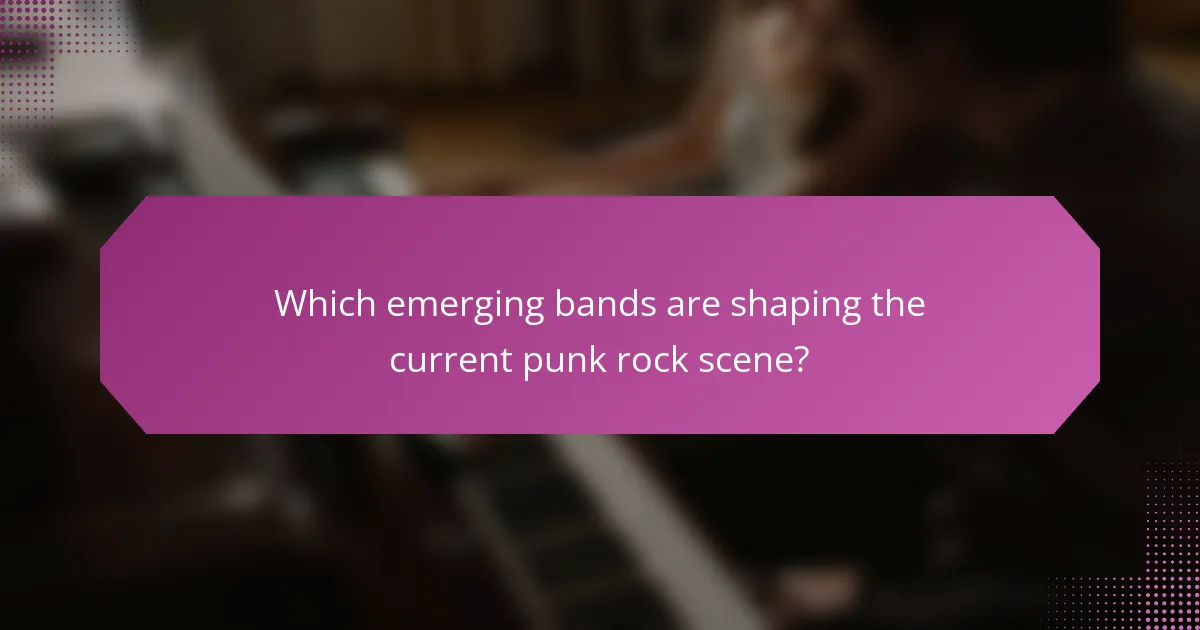
Which emerging bands are shaping the current punk rock scene?
Emerging bands like Turnstile, Amigo the Devil, and Poppy are reshaping the punk rock scene. These artists blend traditional punk with diverse influences, attracting new audiences. Turnstile’s energetic sound and innovative performances exemplify this evolution. Amigo the Devil combines folk elements with punk, creating a unique narrative style. Poppy’s genre-blurring approach challenges punk norms, showcasing the scene’s adaptability. This transformation highlights punk rock’s ongoing relevance and its ability to resonate with contemporary issues.
What unique sounds and styles are these bands introducing?
Emerging bands are introducing diverse sounds and styles that redefine punk rock. These include a fusion of genres, incorporating elements from electronic music, hip-hop, and indie rock. Bands like Idles and Fontaines D.C. emphasize social commentary through their lyrics while experimenting with varying tempos and instrumentation. Unique attributes include the use of unconventional instruments and a focus on emotional vulnerability, setting them apart from traditional punk. Rarely, some bands are blending punk with cultural influences, showcasing their heritage through music.
How do regional influences affect the music of emerging punk bands?
Regional influences significantly shape the music of emerging punk bands by infusing local culture and social issues into their sound. Bands often draw inspiration from their surroundings, reflecting regional characteristics through lyrics, instrumentation, and style.
For example, punk bands in urban areas might incorporate elements of hip-hop or electronic music, while those in rural settings may emphasize acoustic sounds and storytelling. This diverse fusion creates unique sub-genres, allowing bands to express local identity while remaining connected to the broader punk movement.
Additionally, socio-political climates in different regions impact lyrical themes. Bands from areas facing economic hardship may focus on protest and resistance, while those in more stable environments might explore personal narratives. This variance in expression enriches the punk genre, making it a dynamic and evolving form of music that resonates with diverse audiences.
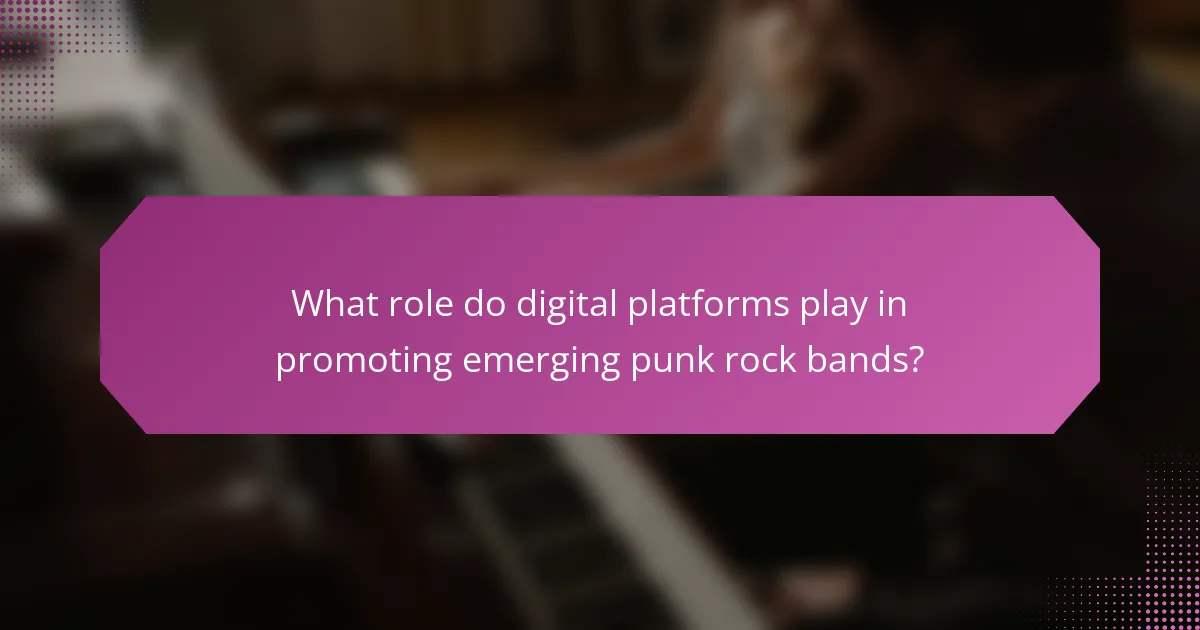
What role do digital platforms play in promoting emerging punk rock bands?
Digital platforms significantly enhance the visibility of emerging punk rock bands by providing accessible channels for promotion. These platforms enable bands to reach wider audiences, share music, and engage with fans directly. Social media, streaming services, and music blogs serve as vital tools for discovery and promotion. For instance, platforms like Bandcamp and SoundCloud allow bands to showcase their work without traditional barriers. As a result, many emerging bands gain traction and build dedicated followings through these digital avenues. The unique attribute of digital platforms is their ability to facilitate real-time interaction between artists and fans, fostering community and support.
Which platforms are most popular among new punk rock artists?
Social media platforms, particularly Instagram and TikTok, are most popular among new punk rock artists. These platforms allow for creative expression and direct engagement with fans. Artists can share their music, visuals, and personal stories, building a loyal following. Streaming services like Spotify also play a crucial role in music distribution and discovery. Emerging punk rock bands utilize these platforms to showcase their unique sound and connect with a broader audience.
How do emerging bands leverage social media for growth?
Emerging bands leverage social media to grow their audience and engage fans directly. They utilize platforms like Instagram, TikTok, and Twitter to share music, behind-the-scenes content, and personal stories. This direct interaction fosters community and loyalty.
Social media allows bands to showcase their unique attributes, such as distinct sounds or visual styles, reaching niche audiences effectively. For instance, viral challenges on TikTok can propel songs into mainstream awareness quickly.
Additionally, analytics tools on these platforms help bands understand their audience demographics and preferences. This data-driven approach enables targeted marketing strategies, enhancing their growth potential.
Collaborations with influencers amplify their reach, as these partnerships introduce the bands to new listeners. The combination of creative content and strategic use of social media is key to their success in a competitive landscape.
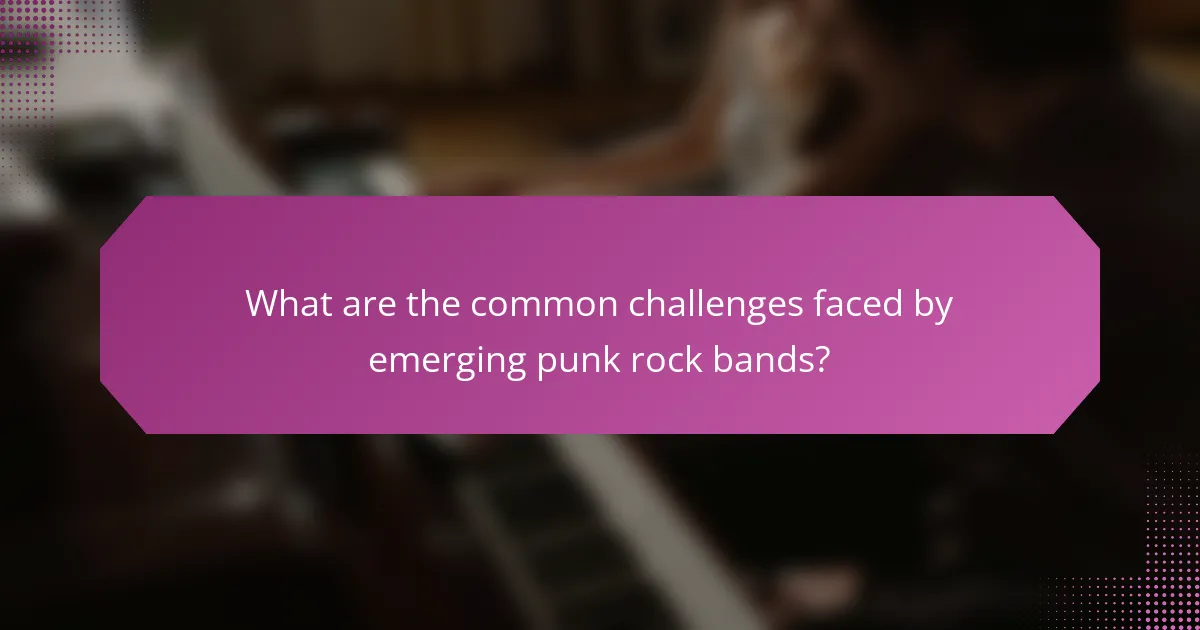
What are the common challenges faced by emerging punk rock bands?
Emerging punk rock bands commonly face challenges such as limited access to resources, difficulty in gaining recognition, and struggles with maintaining a unique sound. These obstacles can hinder their growth and visibility in a competitive music landscape.
Limited funding restricts their ability to produce quality recordings and promote their work effectively. Gaining traction in a crowded genre often requires innovative marketing strategies and strong networking skills. Additionally, the pressure to conform to established norms can stifle creativity, making it challenging for bands to stand out.
The evolving nature of punk rock demands adaptability, as emerging bands must navigate shifting musical trends while staying true to their roots. Balancing artistic integrity with commercial viability remains a significant hurdle for many.
How do financial constraints impact band development?
Financial constraints significantly hinder band development by limiting resources for recording, touring, and promotion. Emerging punk rock bands often struggle to secure funding, which affects their ability to reach wider audiences. Limited financial backing can restrict access to quality production and marketing, reducing their competitive edge. As a result, many bands rely on grassroots efforts and social media to gain visibility, which can be less effective than traditional methods.
What are the struggles of maintaining authenticity in a commercialized music industry?
Maintaining authenticity in a commercialized music industry is challenging due to market pressures and audience expectations. Emerging punk rock bands often struggle to balance creative expression with commercial viability. The pressure to conform to mainstream trends can dilute their unique sound and message. Additionally, the industry’s focus on profitability can lead to compromises in artistic integrity. As a result, many bands find it difficult to stay true to their roots while navigating the complexities of a commercial landscape.
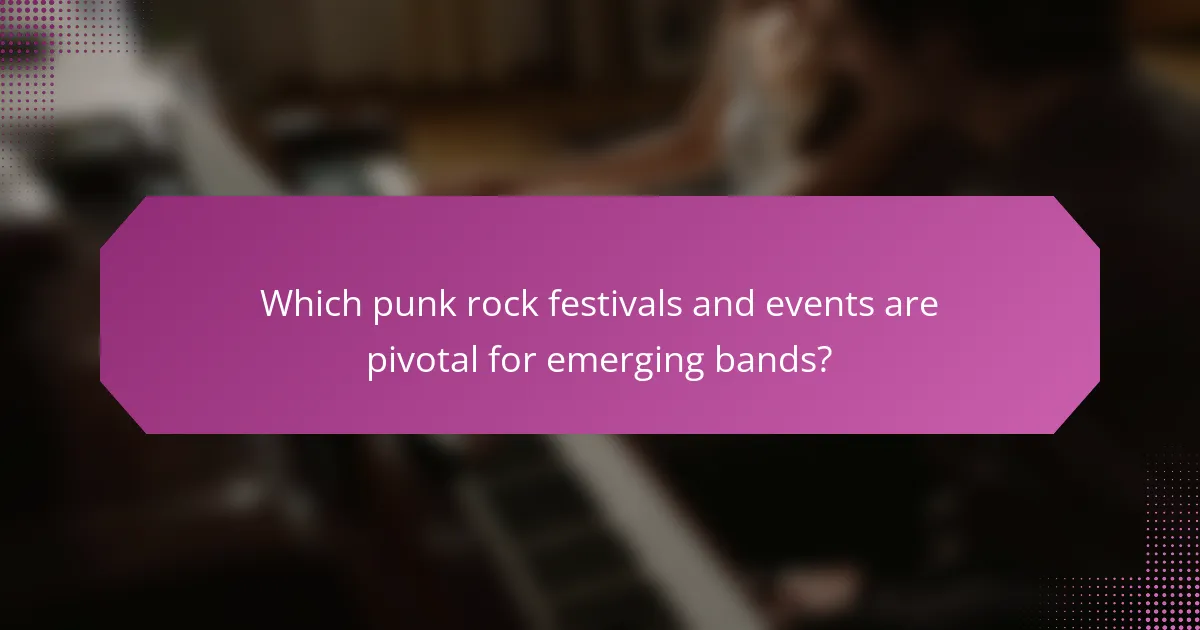
Which punk rock festivals and events are pivotal for emerging bands?
Pivotal punk rock festivals for emerging bands include the Punk Rock Bowling, Fest, and Rebellion Festival. These events offer platforms for new talent, fostering connections and exposure.
Punk Rock Bowling features a mix of established and emerging bands, attracting diverse audiences. The Fest in Gainesville, Florida, emphasizes independent music, showcasing hundreds of bands across various genres. Rebellion Festival in Blackpool highlights punk’s rich history while promoting up-and-coming acts.
These festivals not only celebrate punk rock’s evolution but also play a crucial role in the careers of emerging bands.
What opportunities do these events provide for exposure and networking?
Emerging bands in punk rock events provide significant opportunities for exposure and networking. These gatherings allow artists to connect with industry professionals, fans, and other musicians. As a result, bands can gain visibility, share ideas, and collaborate on projects. Networking at these events often leads to potential gigs, media coverage, and partnerships that can elevate a band’s profile. Additionally, the communal atmosphere fosters a sense of belonging and support within the punk rock community, enhancing creative growth and collaboration.
How do festivals differ in their support for local versus international talent?
Festivals often prioritize local talent to foster community engagement while also featuring international acts for broader appeal. Local bands benefit from increased exposure and support, while international acts draw diverse audiences. This balance enhances festival experiences and promotes the evolution of genres like punk rock through emerging bands. Local talent may showcase unique cultural influences, while international acts can introduce new styles and trends, enriching the overall festival atmosphere.
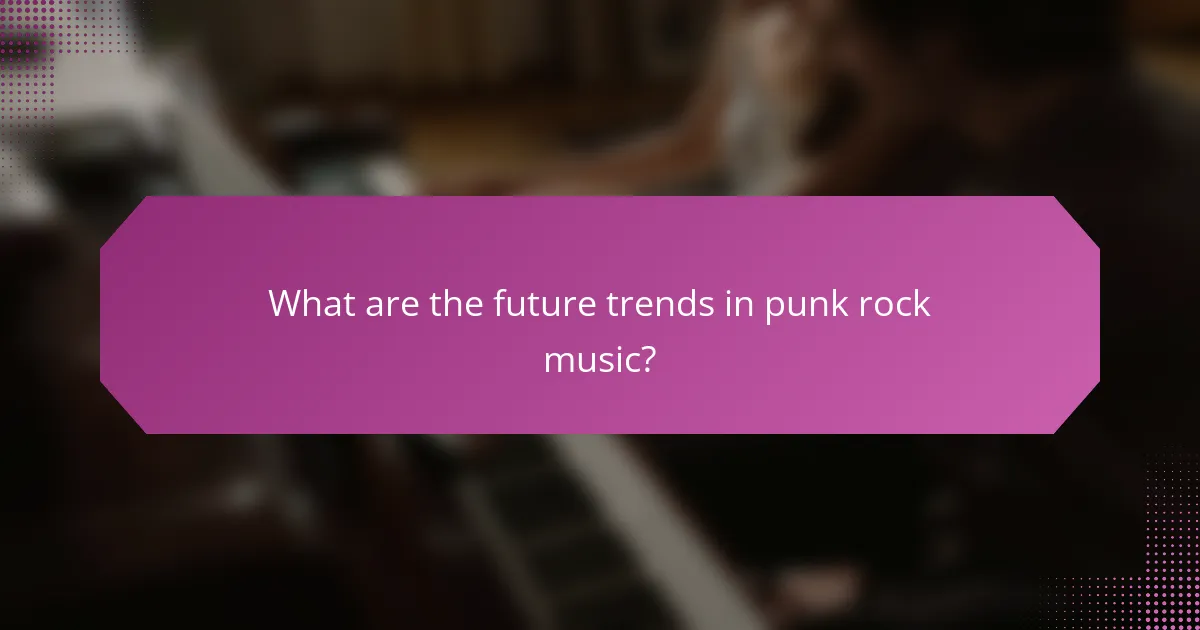
What are the future trends in punk rock music?
The future trends in punk rock music focus on the emergence of innovative bands blending diverse genres. These new artists often experiment with electronic elements and socially conscious lyrics, reflecting current cultural issues.
Collaborations between punk bands and artists from other genres are becoming more common, creating unique sounds. For instance, punk-infused hip-hop and pop-punk revivals are gaining traction, attracting younger audiences.
The DIY ethic remains strong, with many bands leveraging social media for promotion and distribution. This approach allows for greater artistic freedom and direct engagement with fans.
As punk rock evolves, it continues to challenge norms while remaining rooted in its rebellious spirit. Emerging bands will define the genre’s future through creativity and adaptability.
How is the genre adapting to technological advancements?
The punk rock genre is adapting to technological advancements by incorporating digital tools and platforms. Emerging bands leverage social media for promotion, allowing for rapid audience engagement. Streaming services enable wider distribution, giving independent artists access to global listeners. Additionally, technology facilitates innovative sound production, leading to unique musical styles. The integration of virtual reality in live performances enhances the concert experience, attracting tech-savvy fans. As a result, punk rock continues to evolve while maintaining its core ethos of rebellion and authenticity.
Which themes are emerging in the lyrics of new punk bands?
Emerging punk bands are increasingly addressing themes of social justice, mental health, and environmental issues. These topics reflect changing cultural landscapes and resonate with younger audiences.
Many new punk lyrics emphasize activism, challenging systemic oppression and advocating for marginalized communities. This marks a shift from traditional punk themes, which often focused on rebellion and anti-establishment sentiments.
Mental health is another prominent theme, with bands using their lyrics to destigmatize struggles and promote open dialogue. This unique attribute showcases a more vulnerable side of punk music.
Environmental concerns are also gaining traction, with bands expressing urgency about climate change and sustainability. This rare attribute highlights punk’s evolution as it integrates contemporary global issues into its narrative.
What best practices can emerging punk rock bands adopt for success?
Emerging punk rock bands can adopt several best practices for success. They should focus on building a strong online presence through social media and music streaming platforms. Collaborating with other artists can expand their reach and introduce them to new audiences. Engaging with fans at live shows fosters a loyal community. Additionally, maintaining a consistent brand identity helps in standing out. Lastly, leveraging local music scenes can provide valuable networking opportunities and support.
